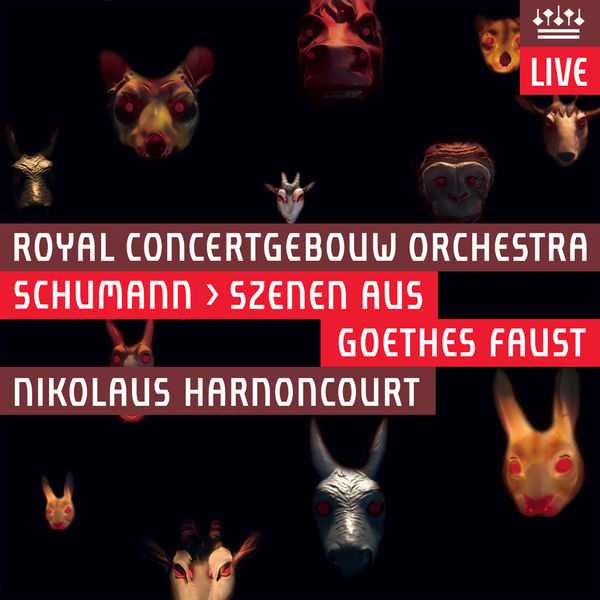

Composer: Robert Schumann
Performer: Christian Gerhaher, Christiane Iven, Alastair Miles, Werner Güra, Mojca Erdmann, Birgit Remmert, Elisabeth von Magnus, Franz-Josef Selig, Netherlands Radio Choir, Netherlands Children’s Choir
Orchestra: Royal Concertgebouw Orchestra
Conductor: Nikolaus Harnoncourt
Format: FLAC (tracks)
Label: RCO Live
Catalogue: RCO09001
Release: 2009
Size: 1.84 GB
Recovery: +3%
Scan: cover
Scenes from Goethe’s Faust, WoO 3 (Live)
01. Overture
Part 1
02. I. “Du kantest mich, o kleiner Engel, wieder” (Faust, Gretchen, Mephistopheles, Marthe)
03. II. “Ach neige, Du Schmerzensreiche” (Gretchen)
Part 2
04. I. “Wie anders, Gretchen, war dir’s” (Böser Geist, Gretchen, Chorus)
05. II. “Die ihr dies Haupt umschwebt im luft’gen Kreise” (Ariel, Chorus)
06. I. “Täler grünen, Hügel Schwellen” (Chorus, Ariel)
07. I. “Des Lebens Pulse schlagen frisch lebendig” (Faust)
08. I. “So ist es also, wenn ein sehnend Hoffen” (Faust)
09. II. “Ich heisse der Mangel” (Mangel, Schuld, Sorge, Not)
10. II. “Vier sah ich kommen, drei nur gehn” (Faust, Sorge)
11. II. “Die Nacht scheint tiefer tief hereinzudringen” (Faust) [Live]
12. III. “Herbei, herbei! Herein, herein!” (Mephistopheles, Lemuren, Faust)
Part 3
13. I. “Waldung, sie schwankt heran” (Chorus)
14. II. “Ewiger Wonnebrand” (Pater Ecstaticus)
15. III. “Wie Felsenabgrund mir zu Füssen” (Pater Profundus)
16. III. “Welch ein Morgenwölkchen schwebet” (Pater Seraphicus, Seliger Knaben)
17. IVa. “Gerettet ist das Edle Glied” (Engel, Chorus)
18. IVb. “Gerettet ist das Edle Glied” (Engel, Chorus, Mezzo, Tenor, Bass)
19. V. “Hier ist die Aussicht frei” (Doctor Marianus)
20. VI. “Dir, der Unberührbaren” (Doctor Marianus, Chorus, Bass, Mater Gloriosa, Magna Peccatrix, Mulier Samaritana, Maria Aegyptiaca, Una Poenitentum)
21. VII. “Alles vergängliche ist nur ein Gleichnis” (Chorus Mysticus)
In April 2008 Nikolaus Harnoncourt and the Royal Concertgebouw Orchestra executed a series of performances of Schumann’s rarely heard masterpiece Szenen aus Goethes Faust.These successful performances were recorded live and edited into the release that you have before you. Nikolaus Harnoncourt made his debut with the Royal Concertgebouw Orchestra in 1975, where his St John and St Matthew Passions opened a whole new chapter in the Amsterdam tradition of performing these works. With the RCO, he directed a number of impressive opera productions, including the Mozart operas by librettist Da Ponte and Strauss’ Die Fledermaus, and a great number of symphonic concerts, including symphonies by Haydn, Mozart, Schubert and Dvorák. Much of the repertoire Harnoncourt conducted with the Concertgebouw Orchestra has been recorded and has also received many awards. He was made a Knight of the Order of the Dutch Lion in 2006. Nikolaus Harnoncourt was appointed honorary guest conductor in October 2000.
Nikolaus Harnoncourt on Schumann’s Faust-Szenen:
“When I think of Schumann, I picture him at the café in Dresden where he would meet Wagner and Mendelssohn every week.They were about the same age, and all three were from Saxony. Luckily for Wagner’s reputation, both the others died young; had they lived longer, simultaneously with Wagner, music history would have been very different indeed. I consider Schumann the greatest genius of the three – Wagner’s genius was not primarily musical, but theatrical. One of the things that make Faust so incredible is Schumann’s ability to select precisely those scenes from such a huge drama which illustrate that one aspect of redemption. In music, there are two or three famous sunrises – in The Creation and The Seasons by Haydn, and in Schumann’s Faust-Szenen: Faust finds himself in a deep cavern. Day breaks, and Faust awakens to see how the sun shines upon the highest mountain tops. He himself still lies in darkness. Once the sunlight reaches him, he says, “So let the sun remain behind me!” because his eyes cannot bear the light. I think this sunrise with its oscillating changes of colour is one of the most beautiful moments in the history of music.”